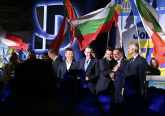Last week, I debated how much more the Greek nation can take given the enormous internal and external pressures on families, society and the nation. When discussing this with my friend and colleague Pavlos Efthymiou, we realised that some important points were missing and have rewritten the article together (also published on ELIAMEP).
Mainstream International Relations (IR) thinking (see Realism, Liberalism) holds that the national interest drives states to act the way they do on the international stage. This post-hoc rationalising to explain policy outcomes works successfully enough to be employed by the majority of policy-makers, academics, and analysts to inform their audiences. However, what they are often missing is how such an interest comes about and what it is fuelled by – in other words, particular cultural characteristics of states are overlooked.
Richard Ned Lebow of Dartmouth University published an innovative and highly insightful study in 2010 to explain ‘Why Nations Fight’. In contrast to most mainstream contemporary political scientists Lebow goes back to the writings of ancient Greeks, among others Thucydides, Socrates, Homer, Plato, Aristotle to draw lessons from their wisdom. He contends that appetite, spirit and reason are fundamental drives, each seeking its own ends (Lebow 2010: 65; 2006: 431). It is the definition of four generic motives that led to initiate war: fear, interest, standing, and revenge. Such an approach reminds Dominic Moisi’s (2009) suggestions regarding the role collective memory as well as collective identities and emotions may play in influencing geopolitics. Moisi also explored how collective identities of fear, humiliation and hope may translate into powerful influences in the realm of international relations/geopolitics (ibid.).
If the interest to survive financially, maintain one’s living standard and retain one’s political, social and economic standing is one of several motives which can potentially aggravate tensions among nations[1], then the following conclusion can be safely drawn: Europeans should be more cautious, subtle and understanding when trying to assist a country out of a deep economic, social and political crisis. In particular, it is now the dominant view that austerity alone does not constitute the silver bullet, coupled with a growing recognition of the need for a counterbalancing strategy aiming at reigniting growth. It is also increasingly possible that this new model of tough intra-EU negotiation might erode the Union’s attractiveness/ soft power (Biscop, 2011; Tsoukalis, 2012; Youngs, 2011: 3-4; Watt, 2012: 68).
The fact that the Greek people see their misfortunes to an extent as the result of an externally-pursued strategic reduction of their living standard is perhaps the clearest indication that EU and its most powerful member states need to be careful when interacting with this proud nation. Efforts to ‘save Greece’ may be imbued in the Greek collective memory as exactly the opposite, as an external economic punishment, through what was at times perceived as a deeply humiliating process. The gap between self and external perception is often the most hurtful. This could go as far as humiliating a great European nation. “Humiliation peaks when you are convinced that the Other has intruded into the private realm of your own life and has made you utterly dependent…[A] future in utter contrast with an idealized, glorified past a future in which your political, economic, social, cultural conditions are dictated by the Other.” (Moisi, 2009: 56-57). To complete the equivalence, after difficult months of external pressure it is understandable to feel the fear of default and total failure and lack hope and perspective. Moisi’s conclusion regarding humiliation without hope worryingly backs Lebow: “humiliation without hope leads to despair and to the nurturing of a yearning for revenge that can easily turn into an impulse towards destruction” (Moisi, 2009: 57 – our emphasis).
Signs of Tenuousness in the Greek-German/Troika Relations
If the message of the Greek president, accusing the German Finance Minister of insulting his nation (Reuters 2012) is indicative of a growing dynamic inside Greece, then a change of gear by European and particularly German leaders is required urgently.
The Greek nation is not calling to arms yet, nor will it do so in the future. The major risk for both Greece and Europe is the possibility of Greece cracking under pressure, and – in a brief-nationalist/populist moment of ‘bravery’ and national ‘pride’ – abandoning the mechanism, and together with it, the euro and Europe. In other words, as domestic politics matter for German decision makers – be that opinion polls, media, or upcoming regional or national elections – the same is true for Greece, where populism and pride have already re-appeared in the Greek political scene, gaining ground everyday and epitomized by the rise of the left and the withdrawal of the far right from the coalition government. An unfortunate self-destructive ‘Greek moment’ would critically hamper European integration, undermine the promise of prosperity ‘in the Kantian Paradise’ (Kagan, 2005), and potential post-default geopolitical implications for Greece would shatter the EU’s credibility as a security provider and/or guarantor (see Solidarity Clause). Tsoukalis (2012: 1) has framed very accurately the dilemma for Germany, Greece and Europe: “The stakes are high. Will the crisis act as a powerful catalyst for further integration in Europe? The alternative facing us today is disintegration at very high cost”. In effect the choice is simple, we either take some strategic, calculated steps forward in terms of politico-economic integration in Europe, or we risk a leap back, a free-fall into unknown waters of disintegration and clustering.
Reasons for Additional Care
Looking at the history of war, peace and honor in Greece (from the ancient times of King Leonidas and Alexander the Great, to WWII and the Korean War, to the 1974 student movement) might help one understand the importance of honour, standing and revenge in Greek society. We should also not forget the Greek and Spartan fighting morale, which few European countries can rival. In times of financial austerity, military spending is constrained by the willingness of a society to pay for its security and interests. No country in Europe can really match Greece in its willingness to defend its pride, interest and standing – and similarly, for no country in Europe are the costs of potential economic collapse so closely associated with possible geopolitical implications (e.g. Dokos, 2012: 17). In view of this reality, further sensitivity should be shown towards Greece, whose feeling of pressure is naturally exacerbated by difficulties associated with juggling with maintaining independent deterrent capabilities – its dominant strategy since independence, and overcoming one of the worst financial situations the nation has ever experienced. Greece and Europe are at a critical juncture, failure to understand each other promises to be very damaging for both.
In the last ten years (1999-2009) Greece has spent 3.7% of its GDP on defence, more than one percentage point more than any other European nation. France, the United Kingdom and Cyprus, the next in line are spending between 2.4 to 2.5%. In 2010, the Greek army employed 156,600 military personnel, or 8.3% of all European military personnel. This compares to 9.3% of all European military personnel by the United Kingdom (or 175,690)[2]. So if military indicators are any guide to how much a nation cares about its pride, standing and honour, then Greece is playing in a league of its own in Europe. Without a doubt it does so in regard to culture, history and developments in philosophy, politics, medicine, mathematics or almost any discipline for that matter if it comes to laying the foundations of Western civilization. Its historical importance and the expressed willingness of its population to defend its standing is in stark contrast to the average European Union member in general and Germany in particular, where anti-military sentiments are the norm and civilian and economic interests trump national sentiments (at least since the re-education after World War II).
This might be the reason why technocrats in Brussels and German newspapers in particular are not able to comprehend how this situation affects Greek citizens, families and its national spirit and hurts their pride beyond reckoning – with the word ‘humiliation; coming up everyday in the leading media, and especially when the signatures of party leaders are requested by the Troika accompanied by rough statements by mainly German policy-makers (see Chancellor Merkel, Finance-Minister Schäuble and Economic Minister Rösler). While Greek policy-makers and arguably the people have so far endured this process, feelings of shame, humiliation, and anger are multiplying, and the bitterness of this grudge is not going to abandon the Greeks until they feel an equal partner in the European family. Moisi explains that humiliation nurtures revenge, which according to Lebow is among the main mn n otives for states going to war. European leaders must not allow a resurgence of conflictual relations (of any form) in Europe, and especially between member states. The credibility of the EU depends extensively on its impressively successful (insofar) intra-EU mechanisms to resolve issues and disagreements.
Many Members of ONE European Family
Political messages are often devoid of content, but more than ever does it count in a situation of crises of how they are transmitted, announced and perceived. A swift overview of the balance of power in the Greek parliament – with the dramatic weakening of the coalition, of the opinion polls which show a dramatic shift towards parties advocating easy, pain-free solutions – investing on the populist line, of the Greek media recording the reactions of the Greek people, one undoubtedly wonders ‘how much more the Greek nation can take’. If Lebow’s and Moisi’s alternative readings of the dynamic of International Relations are any guide, then understanding that it is not just the national interest that motivates nations, but also fear, honour, humiliation, standing and revenge, is an urgent necessity. If European policy-makers fail to switch gears and respect Greek pride and honour when approaching the economic crisis, the potential backlash might be devastating for both Greece and Europe with far-reaching social, political and economic implications.
In particular, German politicians need to be more cautious in tuning their messages to the Greek audience. Similarly, it is the responsibility of the political elites in all EU member states, and especially those states, which have a leading role in the efforts to address the crisis be that through their strength or weakness, to educate their publics and give to the media messages in the spirit of European ideals and values. We have to avoid ‘othering’ processes and stereotyping in Europe at all costs, and steer clear of phenomena as those recorded in the Spiegel (Spiegel 2012; Korge and Batzoglou, 2012) or as the attacks by Bild (see Kounalaki, 2012) and most (in)famously the German Focus magazine (22.02.10) (Spiegel, 2011). Such public expressions hamper the European identity shared equally by all EU citizens, and distort the images held by the respective collectives. It is time to bend differences and bridge the gaps in the understanding of each other, come to terms with how the Greek people feel, because they are not only friends but family.
Yes, some members of the European family are today in crisis, and need to change in order to meet the economic reality and challenges of this globalized 21st century world economy. However, this should work as a catalyst to boost EU solidarity and not as a divisive force that puts it to the test. It is time to recognise that the efforts of the Greek nation deserve Europe’s respect and support, in achieving what is after all our common goal – greater strength through our unity! However, it is also absolutely necessary that Greece takes ownership and does what it is necessary for its future. Yes, external pressures and support can prove useful and beneficial, but overall this has to be a process of partners, not one European country depending on others. Greece needs to become more proactive, leading the rescue effort, pushing multiple growth-targeted reforms and evade the current passivity of awaiting dictums from abroad. And when it so does, Europe must be there supportive and encouraging to help Greece pull it out.
Pavlos Efthymiou is a PhD Candidate in Politics and International Studies, St. Edmund’s College, University of Cambridge, UK.
Hubertus Juergenliemk is a PhD student at the University of Cambridge and a visiting doctoral student at the University of Oxford during the 2011-12 academic year.
References
Bajnai, G., Fischer, T., Hare, S., Hoffmann, S., Nicolaïdis, K., Rossi, V., Viehoff, J. and Watt, A., eds., 2012. Solidarity: For Sale? The Social Dimension of the New European Economic Governance. Güterloh: Bertelsmann Stiftung.
Biscop, S., 2011: Foreign Policy and the Euro: We Have an Idea. Egmont Institute Security Policy Brief, 30, pp.1-4.
Castle, S., 2012: EU Leaders Set to Conclude that Austerity is Not Enough. New York Times [online]. Available from: http://www.nytimes.com/2012/01/30/world/europe/30iht-union30.html [Accessed 24 February 2012].
International Institute for Strategic Studies (IISS), 2011. The Military Balance. London: Institute for Strategic Studies.
Juncker, J-C., 2012. Mega Channel [online]. Available from: http://www.megatv.com/megagegonota/summary.asp?catid=17571&video=1 [Accessed 25 February 2012].
Kagan, R., 2004. Paradise and Power: America and Europe in the New World Order. New York: Atlantic Books.
Kounalaki, 2012. Germans not fascists, Greeks not lazy. Kathimerini [online]. Available from: http://www.eurotopics.net/en/home/presseschau/archiv/article/ARTICLE100854-Germans-not-fascists-Greeks-not-lazy [Accessed 25 February 2012].
Korge, J. And Batzoglou, F., 2012. Anti-German Mood Heats Up in Greece. Spiegel [online]. Available from: http://www.spiegel.de/international/europe/0,1518,814344,00.html [Accessed 25 February 2012].
Lebow, R.Ν., 2010. Why Nations Fight. Cambridge: Cambridge University Press.
Lebow, R.N, 2008. A Cultural Theory of International Relations. Cambridge: Cambridge University Press.
Lebow, R.N., 2006. Fear, interest and honour: outlines of a theory of International Relations. International Affairs, 82 (3), pp.431-448.
Moisi, D., 2009. The Geopolitics of Emotion. How Cultures of Fear, Humiliation and Hope are Reshaping the World. New York: Anchor Books.
Reuters, 2012: Greek president attacks German minister’s “insults” [online]. Available from: http://www.reuters.com/article/2012/02/15/us-greece-germany-idUSTRE81E1VK20120215 [Accessed 14 February 2012].
Spiegel, 2011. Angry Greeks to Sue German Magazine for Defamation [online]. Available from: http://www.spiegel.de/international/europe/0,1518,758326,00.html [Accessed 25 February 2012].
Spiegel, 2012. Greek President’s ‘Wrath Is Exaggerated but Ominous’ [online]. Available from: http://www.spiegel.de/international/0,1518,815973,00.html [Accessed 27 February 2012].
Watt, A., 2012. Solidarity and Cohesion within and between Countries in a Europe in Crisis. In: G. Bajnai, T. Fischer, S. Hare, S. Hoffmann, K. Nicolaïdis, V. Rossi, J. Viehoff and A.Watt, eds. Solidarity: For Sale? The Social Dimension of the New European Economic Governance. Güterloh: Bertelsmann Stiftung, pp.45-72.
World Bank, 2012. Open data for Population, GDP and Defence expenditure as share of GDP [online]. Available from: http://data.worldbank.org/ [Accessed 17 November 2011].
Youngs, R., 2011: European Foreign Policy and the Economic Crisis: What Impact and How to Respond. Madrid. FRIDE Working Paper, 111.
[1] A historian would probably refer here to Ancient Rome’s policy vis-a-vis Carthage.
[2] Based on the IISS Military Balance 2011 and the World Bank population estimate for 2010.








No Comment